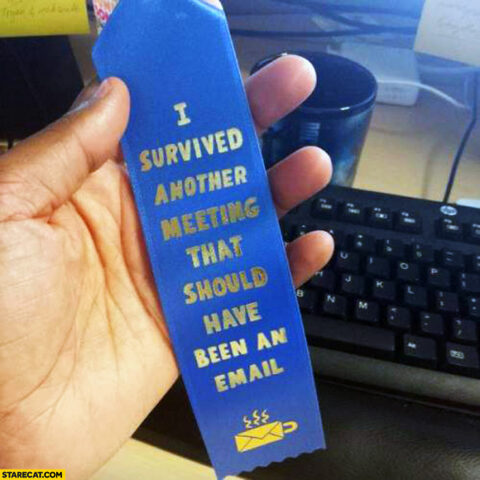NPR runs an article entitled “Time To Ditch Those Awful Zoom Calls, CEOs Say”.
I agree, Zoom calls are horrific (as are all conference calls), but the idea that telecommuting is bad for business is, like an old turd, surfacing once again at the top of the septic tank called “Bad CEO Second Thoughts”.
Satya Nadella, he of Microsoft Teams, says (according to the article), “What we as human beings need, want, seek … is human contact.”
Jamie Dimon, CEO of my own bank, JPMorgan Chase, “is particularly worried about how working from home has affected JPMorgan’s younger employees. He told analysts that productivity had dipped, especially on Mondays and Fridays. Dimon says bringing people back to the office is paramount to fostering creativity.”
NPR adds, editorially, “The bloom is clearly off this rose.”
Well, now. Is it really? I ask, because I’ve been telecommuting happily and successfully for 25 years, come December 29. Long before the WuFlu, and frankly, before (but not terribly so) the advent of high-speed residential Internet. Until November 2002, I dialed up every day to my local ISP with a 56k modem. Had a second line in the house for that purpose. Remote Desktop was not a thing, back then; I got my mail off of an IBM mainframe (the company traded a software license for accounts on the customer’s 4381), using a 3270 terminal emulator.
Satya hasn’t got a lot of room to talk about Zoom, since he’s the CEO of a company that has several competing technologies (Teams, Skype, Skype for Business), none of which were really ready for prime time like Zoom was when everybody shifted home in March. (One could argue, uncharitably, that Zoom might have had advance warning from the PRC.) What Satya really wishes is that you were using Teams or SFB right now instead of Zoom. Since you aren’t (well, some are, we’re not), the whole thing has just made Satya a sourpuss and down on telework. He probably doesn’t want actual human contact any more than I do. He’s a geek, we’re all introverts to one level or another.
Jamie Dimon has been in the C-Suite too long to know how things work down on the floors where the peons work. Productivity has always suffered on Monday mornings and Friday afternoons. I’ve been watching that phenomenon for 25 years. Support mail on Monday mornings is usually the frantic communications from over the weekend when something broke (usually the Internet), and other than that, it doesn’t really get started up till around 10 or 11 AM, after everyone’s had their coffee and doughnut, and yakked with the guy in the next cube about how the local team did over the weekend, yada yada yada. Then it gets busy, and stays busy till right after noontime on Friday, when everybody sits back with a latte or a soft drink, and a snack, and starts to unwind for the weekend. Jamie should try this. Life is much less stressful that way.
Back to NPR:
As for the employees, who sit in front of a computer every day in the same spot of their homes, often on video chat, they found the experience “draining.” They missed being able to connect face to face with colleagues and had trouble setting boundaries for when work started or ended.
Um…25 years? The only draining days are the ones that are slow because nothing’s happening. And we don’t use video chat. WTF for? We email constantly. We have one (1) (ONE) department meeting per week, using Skype for Business (because that’s what we have — we’ve been using it since it was called “Lync”), voice only, and if it lasts more than 20 minutes, it’s lasted too long (or we’ve got a particularly knotty problem we have to work out).
I will admit that for about the first four years, I had a problem “setting boundaries for when work started or ended”. But that’s because I lived alone. I got married after four years of telecommuting, and having a wife who had to get up in the morning and go to work, and who came back every evening at around 6PM, did actually help me set those boundaries.
So, NPR goes on and quotes a survey which
found that workers didn’t feel like they needed to behave during virtual meetings when no one was looking. Most of them admitted to “questionable behavior” during virtual brainstorm meetings, including 1 in 10 who admitted using the bathroom while on a call.
BWAH HA HA HA…oh, sorry, my mic was still on.
I have in fact gone to the bathroom while on a Zoom call with a certain group that had to shift to Zoom calls during the stricter lockdown phases over the summer. As long as your mic is off, so what? (Number 1 only, not Number 2.)
On the work calls, I have gotten up to get a soda out of the fridge about twenty feet from where I sit…I’ve run to the back of the house to check on the laundry when the washing machine got out of balance and was going BANG BANG BANG…I’ve walked down to the street and gotten my tenant’s rent check out of the mailbox…dealt with the curiosity of cats, who just have to know what I’m doing at that particular instant…
I wouldn’t call that questionable behavior because it’s no different than what I do all day long anyway. I’ll take a two-minute break to go to the laundry room and switch the wet clothes into the dryer and more dirty clothes into the washer. I’ll answer the phone when my doctor calls to confirm an appointment. Or when a fellow trustee calls to tell me we’ve got a problem down where we both sit on the board of trustees and he wanted to get my opinion on it. I mean, there are things you can do that don’t take much time and can almost be considered multi-tasking…but you have to get used to doing things that way, and it does take more than just a few months to be comfortable about it.
Another C-Suite denizen opines:
Nathan Rawlins, the chief marketing officer at Lucid, said that’s because virtual meetings are often a series of monologues where people are often checked out and feel “this meeting is the sort of thing where I could lift weights.”
Yeah, well…the fact is, even before WuFlu, MOST MEETINGS COULD HAVE BEEN AN EMAIL. There’s a reason why this sort of thing exists:

And that’s why they think that. And have the opportunity to actually go lift weights because they have a fitness machine in the living room, and a wireless headset, and hey, Zoom works on my iPad, and…why not multitask?
So NPR gets all the way to the end of the article, and all of a sudden they get all upbeat and shit:
Still, there is a recognition by workers and employers alike that more is possible with virtual settings than before.
“A lot of people have learned that they can work at home, or that there’s other methods of conducting their business than they might have thought from what they were doing a couple of years ago,” the legendary investor Warren Buffett said at the Berkshire Hathaway annual meeting in May. “When change happens in the world, you adjust to it.”
And despite all the misgivings, Microsoft itself announced just last week that its staff will have the option of working from home permanently. It’s what many other companies are — from Facebook and Twitter to Zillow and Nationwide Insurance — are doing.
I think (as if you give a damn what I think, but hey, I’ve been telecommuting for TWENTY-FIVE YEARS, and that’s more than likely A METRIC FUCKLOAD LONGER THAN YOU HAVE) what is going to evolve is a system where those who want to work from home — and can hack it — will in many cases be allowed to do so. Those who want to go back to the office will go back to the office. Some companies may enjoy the cost savings they’ve reaped by not having to have the lights on or the A/C running all summer, and may well shift to something like a 2-day telework, 3-day office work schedule. Say Mondays and Fridays at home (despite the productivity issues — which might disappear under a mixed-work regime) and T-W-T in the office. Or even telework unless you need to have a meeting, and you go in to the office for the meeting. Which, if you’re smart, you’ll have on Wednesdays. (Note that I couldn’t go in for a meeting if I wanted to, since the office is 600 miles away.)
The fact is, “ditching those awful Zoom calls” is not going to happen because CEOs want it to happen. Theyr’e going to need buy-in from the peons. Pandora’s Box-O’-Telecommuting-Freedom is open for business, baby, and from what the article says, something like 3 in 4 of them like it. So don’t be surprised it it turns out to be difficult to yank that freedom back. It might behoove the C-Suiters to think on how to make the telework experience better, rather than cut it off entirely.
But nah, bro, don’t listen to me. I’ve only been doing it for TWENTY-FIVE YEARS. 🙂
